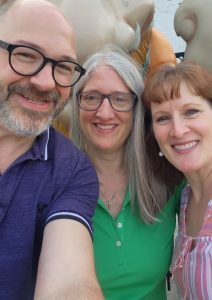
Eric Henderson, left, Amy Van Dyke and Kelly Barcelo bonded as psychology students at Wright State and still work in the mental health field in Dayton today.
“The Three Musketeers” has been part of popular culture for 180 years, a French historical adventure novel about a trio of inseparable soldiers named Athos, Porthos, and Aramis.
There’s a Wright State University version of sorts: Three alumni who met and bonded as psychology students in 1997 and are inseparable to this day, named Kelly Barcelo, Eric Henderson and Amy Van Dyke.
They have thrived for so long in the careers for which they studied they have insight into how the demands of the mental health field have changed and its future.
It’s not so much the classes they shared as undergraduate students, but what they did to further their involvement in their chosen field that led to a bonding.
The friends met in the Psychology Club, which organized on-campus activities to raise awareness about mental health, leading to an annual conference in Chicago.
“The conference was the big highlight,” Henderson said.
Barcelo said the club was particularly beneficial to her.
“As a commuter student, it was important to have a sense of community,” she said. “Having a group to affiliate with was important to me. It gave me a sense of belonging, and I found that with the Psychology Club.”
Van Dyke said the club provided a more intense focus on psychology than classes, and each brought other friends into the club. But for Van Dyke, Barcelo and Henderson, the biggest factor in their friendship was personal chemistry.
“We started off going through similar experiences with college stresses,” Henderson said. “There were things we enjoyed as a commonality. We brought other people into our friend group. But we’ve always maintained a friendship.”
The three students graduated from Wright State in 1999 with bachelor’s degrees in psychology. Henderson and Barcelo then enrolled in Wright State’s graduate school and earned degrees in counseling in 2002, while Van Dyke enrolled later and earned a master’s degree in education in 2005.
Each started working in the mental health field and has remained doing what they studied to do at Wright State.
Henderson is manager of counseling services at Sinclair Community College. Van Dyke is a guidance counselor at Huber Heights City Schools. Barcelo is a mental health therapist and team leader at South Community Behavioral Health Care, a day treatment program in Moraine.
“The fact that we remained friends for so long is not unusual because the strength of our friendship was pretty strong,” Barcelo said. “Remaining in the same field is more uncommon, especially in mental health itself.”
She said working in mental health is so intense that “people I used to work with got out years ago. Some left to pursue other things that were a better fit for their family and financial needs.”
Each has seen the landscape of mental health change over the past several years. Henderson said the college students he counsels coming out of the pandemic isolation struggle with relationship issues, social skills and self-esteem. But they are also more open to talking about what they are dealing with, he said.
Van Dyke said she, too, sees self-esteem issues and stress among her junior high students.
“There are more pressures on them. They’re expected to be more mature – and some of them can’t handle that,” she said.
Barcelo said at the community-based health agency “we’ve been dealing with students’ struggles trying to play catch-up academically. When schools went hybrid or online, a lot of kids got behind. We’re helping kids through that.”
She added, “We work with a lot of kids to build social skills that they don’t have because electronics have taken the place of in-person socialization.”
Their strong friendship is a benefit.
“Sometimes we talk about our tough cases,” Barcelo said. “We protect the confidentiality of our clients, and we give a brief description (of the issue) and ask for ideas of how to handle it.”
Each has a positive vision of the future for their profession.
Van Dyke said she hopes more resources will continue to be available to those who need assistance, in addition to tools such as telehealth and suicide prevention helplines.
Henderson said the stigma associated with talking about mental health is easing, and “hopefully as the next generation comes on board, we’ll get that stigma reduced so that it will be OK to talk about not being OK.”
To Barcelo, in a sense, the future is now.
“I feel connected to Wright State and love giving back,” she said.

 Adventures await
Adventures await  Wright State to expand nursing facilities to meet workforce needs and prepare more graduates for in-demand careers
Wright State to expand nursing facilities to meet workforce needs and prepare more graduates for in-demand careers  Wright State student-athletes make a lasting impact on local family with more to come
Wright State student-athletes make a lasting impact on local family with more to come  Wright State names Rajneesh Suri dean of Raj Soin College of Business
Wright State names Rajneesh Suri dean of Raj Soin College of Business  ‘Only in New York,’ born at Wright State
‘Only in New York,’ born at Wright State 